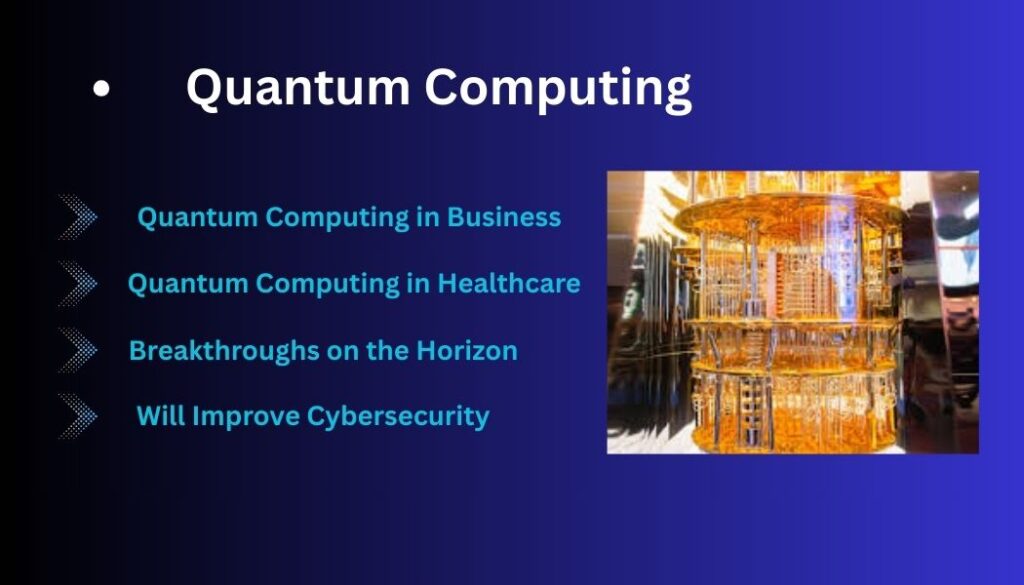Introduction
Quantum Computing is no longer just a futuristic concept. It is rapidly evolving into one of the most transformative technologies of our time. Leveraging the principles of quantum mechanics, this technology has the potential to revolutionize a range of industries, including healthcare, finance, cybersecurity, and beyond. This article explores the core concepts, advancements, and applications of Quantum systems in 2025.
Table of Contents
What is Quantum Computing?
Quantum-Computing refers to a groundbreaking approach that utilizes quantum mechanics to process information in ways that classical computers cannot. Traditional computers use binary bits (0s and 1s) to represent data, but Quantum Computers employ quantum bits, or qubits. These qubits can exist in multiple states simultaneously, a phenomenon known as superposition, which allows for more efficient problem-solving, particularly for complex tasks.

Key Components of Quantum Computing
To understand how Quantum systems works, it’s essential to familiarize yourself with key components:
- Qubits – Unlike binary bits, qubits can exist in multiple states at once, enhancing computational capacity.
- Superposition – This allows qubits to perform many calculations simultaneously, improving efficiency.
- Entanglement – A quantum phenomenon where qubits can become correlated, even over long distances, allowing for faster data processing.
Applications of Quantum Computing
While still in its infancy, Quantum-Computing already promises to revolutionize many sectors:
- Cybersecurity
With its ability to break traditional encryption methods, Quantum systems could significantly alter cybersecurity. However, it also enables the development of quantum-resistant encryption, ensuring data protection in the quantum age. - Healthcare
Quantum Computing has the potential to accelerate drug discovery and enhance the analysis of medical data. Its capacity to solve complex optimization problems will help improve patient care and the efficiency of medical systems. - Finance
In the finance industry, Quantum systems could optimize portfolio management, risk assessment, and financial modeling, providing quicker and more accurate results compared to traditional methods. - Logistics and Supply Chain Management
Quantum algorithms can solve supply chain and logistics optimization problems that are too complex for classical systems, enabling businesses to streamline operations and reduce costs.
Challenges in Quantum Computing
Despite its incredible potential, there are several challenges facing Quantum systems, including:
- Qubit Stability
Maintaining the stability of qubits in a controlled environment is crucial for accurate computations. - Quantum Decoherence
Quantum systems are highly sensitive to interference, which can lead to decoherence, or the loss of quantum information. Developing error-correction techniques is essential for reliable computations.
The Future of Quantum Computing
As we move into 2025, the development of Quantum Computing systems is expected to accelerate. While current technology is still in the experimental phase, experts predict that we will soon see practical applications of Quantum systems, particularly in areas that demand high-level computational power, such as cryptography, artificial intelligence, and data analysis.
Conclusion
Quantum Computing is set to be one of the most transformative technologies of the coming decades. From solving optimization problems to revolutionizing industries like healthcare and cybersecurity, this technology holds incredible potential. As the field continues to evolve, staying informed and adaptable will be key to harnessing its power. Start exploring Quantum-Computing today and position your business for success in the quantum age!
FAQ
- What is Quantum Computing?
This is a new approach to computation that leverages quantum mechanics principles. Unlike classical computers, it uses qubits, which can exist in multiple states simultaneously, making it possible to solve problems much faster than traditional systems. - How does Quantum Computing work?
Quantum Computers work by using quantum bits (qubits), which can be in multiple states at once due to superposition. They also take advantage of quantum entanglement, which allows qubits to be linked over long distances, facilitating faster and more efficient computations. - What industries can benefit from Quantum Computing?
Industries such as healthcare, cybersecurity, finance, and logistics stand to benefit greatly from Quantum-Computing. Its ability to solve complex problems quickly and efficiently opens new doors for innovation and optimization across various sectors. - Is Quantum Computing available for businesses today?
While still in its early stages, businesses can already explore Quantum systems through cloud-based quantum systems provided by several companies. These systems allow companies to run simulations and research without needing their own quantum hardware. - What are the challenges in Quantum-Computing?
Major challenges include maintaining qubit stability, managing quantum decoherence, and developing error-correction techniques to ensure the accuracy and reliability of computations. - How will Quantum Computing impact cybersecurity?
Quantum systems has the potential to break current encryption methods but also offers solutions for quantum-resistant encryption, which will be crucial for securing digital assets in the quantum era.
